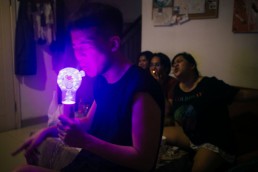Living With Melancholy
Living With Melancholy
Felix Jody Kinarwan, Project Multatuli – Banten
Reynold (25) opened his diary, its cover shows a film clapper image. He smiles, sometimes laughs as he rereads his writing from school days. The writing varies from daily issues, story ideas, to dreams of becoming Broadway artists.
The diary’s papers are crinkled from being soaked in water, some of the writing is now blurred. I spontaneously ask what caused it. There is a pause, then he sighs. In the mid of 2021, Reynold attempted to drown himself in the housing complex pool alongside his diary. The event was one of the multiple attempts he did to end his life. No one knew. until tonight when he finally decides to open up. I am surprised, after knowing him for three years, to me he is a fun and full of humor friend. Tonight, I am left speechless.
Reynold has been diagnosed with depression since the start of university in 2018, or when he was able to pay for professional consultation. But looking back, the symptoms had been there since primary school. Cutting his thighs and wrists was a routine. The physical scars provided a momentary distraction for the mental mess.
“Even a dog knows how to behave better than you!” his mother once said when Reynold was little. The sentence stabbed hard. His self-worth fell apart. At that point, he felt that his life was worthless.
Ever since his parents separated, Reynold was in the care of his mother. He has no good memories with his mother. Reynold received physical and verbal abuse every time he made a mistake. Now he realizes his mother also struggles with mental health issues.
In a scientific journal by Evelina Landstedt and Ylva B. Almquist titled Intergenerational Patterns of Mental Health Problems: The Role of Childhood Peer Status Position, it is shown that 11.8% sons whose parents have mental health issues will likely to suffer from mental health issues in adulthood. For daughters, the percentage is higher, at 13.7%.
The baby boomers generation generally has a negative stigma towards mental health issues. They are used to being raised “the hard way.” Experiencing mental health issues is seen as a weakness. To admit an unstable state of mind can result in being seen as insane. To the boomers, mental health is not something that should really be discussed, it is even ignored. Some of them carry on living with anger in their chests and troubles in their minds.
“Mama threw glasses to Papa
Papa just stared at the shards
Brother was scared of what used to be our tube, and…?
Don’t know why I remember this night after I woke up…?”
(from Reynold’s diary)












